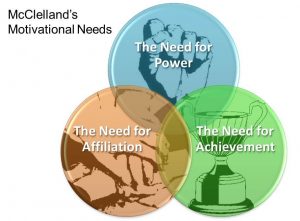During one of our Commerce 101 lectures, we discussed the types of managers and what they are most effective at. Three types of managers were mentioned, affiliative managers, achievement managers, and power managers. During the lecture, it was mentioned that the best manager for an institution is the power manager. According to the definition given, a power manager is concerned with influencing people and constructing power.

McClelland’s theory from chapter 4, Theories of Motivation, reminded me about the lecture on effective managers.1 McClelland split motivation into three needs. It appears that the need for achievement can be linked to achievement managers who focus on results and are not concerned with the way they are perceived. On the other hand, power managers are influenced by the need to steer the company in one direction by exerting influence over their employees. Lastly, affiliative managers are concerned with their own popularity, which does not directly link with the need for affiliation. The need for affiliation refers to the need for an employee to be related with a company.
A question which arose when I made the connection between the two subjects was: “Which type of motivation does the owner of the company want to promote in order to further the organization?

I believe that a combination of the need for achievement and power should be promoted within an organization. The reason for that is because people who are motivated by achievement will strive towards achieving goals, therefore, increasing the overall productivity of the company. In examining it in more detail, an organization functions similarly to a team. In chapter 6, Groups and Teamwork, we discussed that if members of a group are working toward different goals, then the productivity of the team will decrease despite the fact that the members are extremely motivated in achieving their own goals.1 The reason is because each member is working towards a different goal, therefore, keeping the group stagnant. Taking this idea and applying it back to an organization, if employees are motivated by achievement but want to achieve different goals then the organization will remain stagnant.
In conclusion, I believe that in order to create the optimum management team, a combination of power and achievement managers are needed. The power manager (motivated by power) can direct the company towards a common goal by exerting their ability to influence people. But at the same time, the company will experience increased productivity as achievement-oriented motivation, which stimulates productivity, is directed towards one goal. Nevertheless, while I believe that this is the optimum balance for a management team, there may be tension that is created due to conflicting needs. Thus it’s important to acknowledge that the tension may diminish the effects of some of the advantages mentioned.
Works Cited
- Langton, Robbins, Judge, Organizational Behaviour, 7th edition.